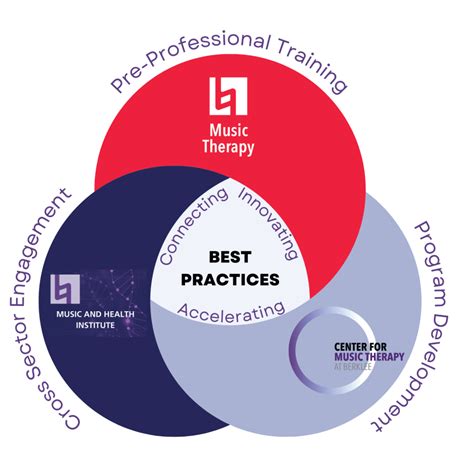Music has been an integral part of human civilization for thousands of years, and its therapeutic effects have been recognized for centuries. Modern research has provided ample evidence of the profound impact music can have on our physical, emotional, and cognitive health.

The Berklee College of Music’s Music Therapy Program
Recognizing the growing need for qualified music therapists, the Berklee College of Music established its renowned music therapy program in 2012. This innovative program, accredited by the American Music Therapy Association (AMTA), provides students with a comprehensive education in the application of music to promote health and well-being.
Benefits of Music Therapy
Music therapy has been shown to have a wide range of benefits, including:
- Reduced stress and anxiety
- Improved mood and sleep quality
- Enhanced cognitive function
- Reduced pain and discomfort
- Increased social interaction and communication
Music Therapy in Various Settings
Music therapists work in a variety of settings, including:
- Hospitals
- Rehabilitation centers
- Nursing homes
- Schools
- Mental health clinics
- Correctional facilities
Applications of Music Therapy
Music therapy is used to address a variety of health concerns, including:
-
Physical Conditions:
- Pain management
- Neurological disorders
- Cardiovascular disease
-
Emotional and Behavioral Conditions:
- Depression
- Anxiety
- Autism spectrum disorder
-
Cognitive Conditions:
- Dementia
- Alzheimer’s disease
- Stroke
Data Supporting the Effectiveness of Music Therapy
Numerous studies have demonstrated the positive effects of music therapy. For example:
- A study published in the journal JAMA Internal Medicine found that music therapy significantly reduced pain and anxiety in patients undergoing surgery.
- A study by the University of California, San Francisco showed that music therapy improved sleep quality in older adults with insomnia.
- A study in the journal Neurology demonstrated that music therapy enhanced cognitive function in individuals with dementia.
Music Therapy as a Complement to Traditional Treatment
Music therapy is not intended to replace traditional medical or psychological treatment. Rather, it can serve as a valuable complement, providing additional support and benefits. Music therapists collaborate with other healthcare professionals to create individualized treatment plans that meet the specific needs of each client.
How to Find a Music Therapist
If you are interested in exploring the benefits of music therapy, there are several ways to find a qualified therapist:
- Contact the AMTA for a directory of certified music therapists in your area.
- Consult with your healthcare provider or psychiatrist for recommendations.
- Reach out to healthcare organizations and hospitals to inquire about their music therapy services.
Conclusion
Berklee Music Therapy is an innovative and evidence-based approach to improving health and well-being. Through the application of music, music therapists empower individuals to overcome challenges, improve their quality of life, and achieve their full potential. Whether you are seeking stress relief, pain management, or cognitive enhancement, music therapy offers a unique and powerful way to promote healing and well-being.
